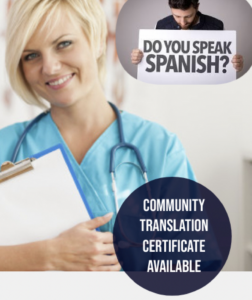Over 37 million people in the United States speak Spanish as their native language and more than 16 million have limited English proficiency. Functional health literacy influences a patient’s ability to read and understand labels on medicine containers, appointment slips, informed-consent documents, and medical instructions – all considered basic health documents that a patient encounters in healthcare settings. At Rutgers University–Camden, health professionals across disciplines can enroll in the following courses designed to prepare them to effectively communicate, treat, and serve Spanish-speaking persons in clinics, hospitals, nursing homes, and doctor’s offices.
Courses
Now available online! Details:
50:940:103 Emergency Spanish ~Intensive course 101+102 in one semester (3 credits)
This course starts at a 101 level and reaches a 102 language proficiency in only one semester. It assumes no prior knowledge of Spanish, and provides all students and health professionals the ability to establish productive communication with Spanish-speaking patients. Prerequisite: None
A course that allows students with an elementary knowledge of Spanish (101). It develops the ability to develop basic, communication skills specifically adapted to the health care environment. Participants will acquire an elementary understanding of grammar and vocabulary in topics such as patient history, symptoms, physical conditions, and emergency response. Prerequisite: Elementary knowledge of Spanish.
For students with prior knowledge of Spanish interested in developing and improving oral and written skills in order to communicate effectively with Spanish-speaking patients, co-workers and professionals. It entails a solid review of grammar and a comprehensive acquisition of vocabulary in topics such as, patient history, symptoms, physical conditions, and emergency response. Prerequisite: Spanish 127 or interview with Director of Spanish for Health Professions Program.
50: 940: 391 Humanism in Healthcare
Humanistic medicine refers to a healthcare model that emphasizes concern for human dignity, whole person care and a patient-centered outlook. It prescribes a respectful and culturally- informed communication among the diverse members of the healthcare team, and their patients. For such reasons, humanism in medicine is now identified as an important contributor to patient care and physician wellness. While few curriculums include a course dedicated to this subject, this class is specifically designed to explore through the humanistic lens the intersections of human connection, patient care and medical practice.
50:940:427 Health and Wellness in the Latinx Community (3 credits) ECL
For students with prior knowledge of Spanish at the intermediate or advanced levels strongly interested in developing and improving the oral and written skills needed to communicate with our community partners and their clients. Participants taking this course will expand their vocabulary in a variety of medical and social service contexts and specialized topics such as nutrition, elder patient care , mental health, and primary care. Prerequisite: Spanish 227 or interview with Director of Spanish for Health Professions Program.
50:940:437 The Community Interpreter (3 credits) ECL
ACTFL OPIc language proficiency assessment administered at the start of the course
Intended for use in universities, colleges and basic training programs, this course offers a comprehensive introduction to the profession of interpretation. While the emphasis is on medical, educational and social services interpreting, legal and faith-based interpreting are also addressed. The course includes a sample code of ethics. While the approach taken targets spoken language interpreting, the course is also useful for sign language interpreters. The text is written in plain English and visually designed to make the content clear and easy to read, with visual aids to meet the needs of an international audience whose native language may not be English. Divided into five chapters, the book tackles the biggest challenges in the field today. The course will be taught in English and available to students with proficiency in any world language. Students will take the ACTFL OPIc language proficiency exam prior to taking the course. Students will practice their interpreting skills at community partner organizations.
ELECTIVE Field Experience, Internship or Study Abroad Courses (3 credit courses)~NOT MANDATORY
50:940:238 A Taste for Culture (Spain). Language, Culture, and Nutrition in the Spanish world
The tastes and flavors of a country’s table are a powerful manifestation of its living collective memory. This course explores how this collective asset, a culinary heritage, is molded by the fluid intersection of social forces (historical events, economic dynamics, food production processes, social practices) and individual choices (family traditions, personal preferences, dietary restrictions). As the experience that bridges multiple paths to cultural understanding, food will become the unifying element of a wide range of discussions exploring topics such as food activism, nutritional equity, and sustainability culinary practices.
57:705:399 Health and Healing in Guatemala: A Service Learning Journey
A course focusing on a cultural, or language-oriented theme, including regular class meetings and appropriate assignments, as well as a short-term learning experience outside the United States. Students will interact with speakers of Spanish while abroad, as they navigate the culture and language in Latin America. All courses currently offered during spring break and summer in Cuba, Guatemala, Spain, and Bolivia.
50:940:399 Internship in Spanish for the Health Professions (3 credits)
Students will engage speakers of Spanish in Camden in a variety of roles, including assisting residents in the completion of medical forms at Vitality Heath Services and the Health and Wellness Center at LEAP Academy. Students will assistant Spanish speaking clients at the Kroc center in a variety of programs and activities.

